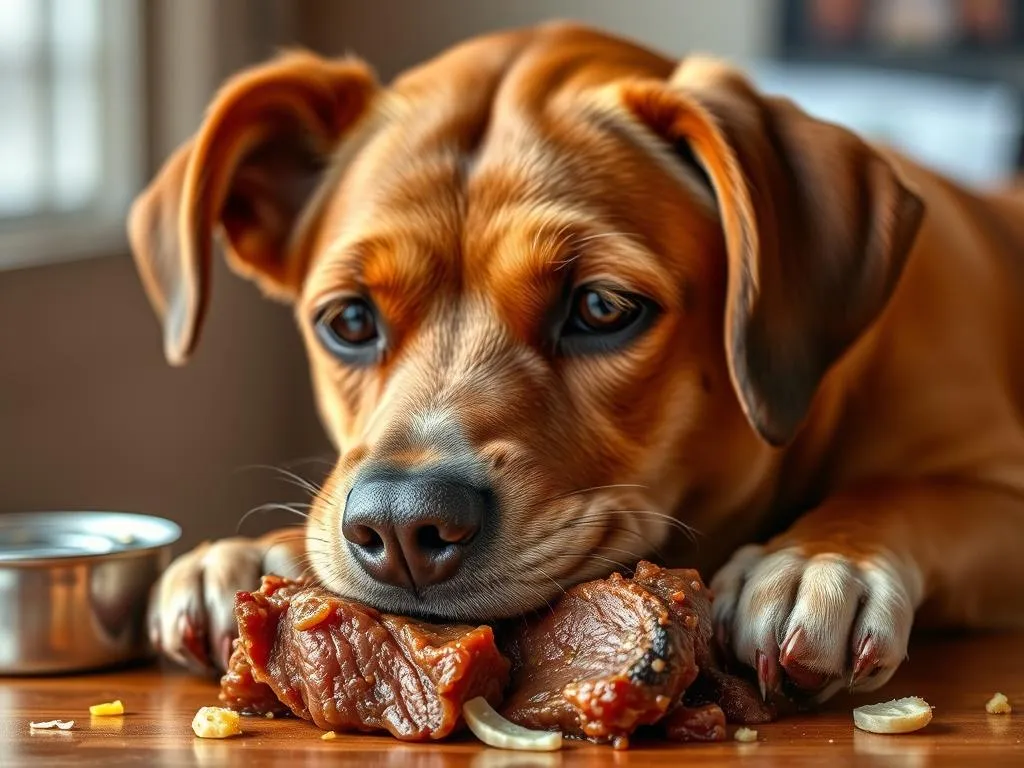
Understanding what our furry friends can and cannot eat is essential for their health and well-being. One common question that often arises among dog owners is: Can dogs eat corned beef? It’s crucial to know which foods are safe and nutritious for dogs, so let’s delve into this topic to help you make informed choices about your dog’s diet.
Understanding Dog Nutrition
Essential Nutrients for Dogs
For a dog to thrive, its diet must include a variety of essential nutrients. These nutrients fall into four primary categories:
- Proteins: Vital for growth, repair, and maintenance of tissues. Proteins are also crucial for the production of enzymes and hormones.
- Fats: Provide energy, support cell structure, and aid in the absorption of certain vitamins. Healthy fats also contribute to a shiny coat and healthy skin.
- Carbohydrates: While dogs can derive nutrients from proteins and fats, carbohydrates can serve as an energy source and provide dietary fiber, which aids in digestion.
- Vitamins and minerals: Essential for metabolic functions and overall health. They support various bodily functions, including immune response and bone health.
The Role of Balanced Diets
A balanced diet is paramount for maintaining a dog’s health. Just like humans, dogs require a mix of these nutrients to function optimally. While many commercial dog foods are formulated to meet these dietary needs, some pet owners prefer to prepare homemade diets for their dogs.
Commercial dog foods are engineered to provide a balanced diet, but it’s essential to read labels carefully to ensure quality. Homemade diets, on the other hand, allow pet owners to control the ingredients and tailor meals to their dog’s specific needs. However, creating a balanced homemade diet requires knowledge and care to avoid deficiencies.
Corned Beef: What Is It?
Ingredients in Corned Beef
Corned beef is a type of salt-cured beef product typically made from brisket or round cuts. The main ingredients include:
- Beef: The primary protein source.
- Salt: Used for curing the beef, which helps preserve it and enhances flavor.
- Spices: Commonly includes peppercorns, mustard seeds, and sometimes sugar, which contribute to its distinctive taste.
The processing method involves brining the beef in a solution of salt and spices, followed by a curing process that can take several days.
Nutritional Profile of Corned Beef
Corned beef is rich in protein, making it appealing from a nutritional standpoint. Here’s a breakdown of its nutritional profile per 100 grams:
- Protein: Approximately 26 grams
- Fat: Around 20 grams (varies depending on the cut)
- Sodium: Can range from 800 to 1,200 milligrams, depending on the curing process
- Other nutrients: Contains B vitamins (like B12) and minerals such as zinc and iron
While corned beef can be a good protein source, its high sodium content raises concerns when considering it for your dog’s diet.
Can Dogs Eat Corned Beef?
Safety Considerations
When it comes to the question of can dogs eat corned beef, the answer isn’t straightforward. While the protein in corned beef can be beneficial, there are several safety considerations to keep in mind:
- High Sodium Content: The sodium levels in corned beef can pose serious health risks for dogs. Excessive salt intake can lead to dehydration, increased thirst, and more severe issues like salt poisoning, which can cause symptoms such as vomiting, diarrhea, tremors, and seizures.
- Preservatives and Additives: Many commercial corned beef products contain preservatives and additives that may not be safe for dogs. Always check the ingredient list for any harmful substances.
When Corned Beef May Be Safe
If you choose to share corned beef with your dog, it should be done with caution:
- Occasional Treats: It’s best to offer corned beef as an occasional treat rather than a regular part of your dog’s diet. Moderation is key to preventing health issues.
- Feeding Guidelines: If you decide to give your dog corned beef, consider small amounts, especially if you’re unsure how they will react. A few small pieces on special occasions can be fine, but always monitor your dog afterward for any adverse reactions.
Signs of Adverse Reactions
If your dog consumes corned beef, be vigilant for any signs of adverse reactions:
- Symptoms of Salt Poisoning: Excessive salt can lead to serious conditions. Look for symptoms such as excessive thirst, urination, vomiting, diarrhea, and lethargy.
- Allergic Reactions: Some dogs may have allergies or sensitivities to beef. Symptoms can include itching, redness, and gastrointestinal upset.
- Digestive Issues: If your dog has a sensitive stomach, introducing rich or salty foods can lead to digestive discomfort, including vomiting and diarrhea.
Alternatives to Corned Beef
Healthier Protein Options for Dogs
If you’re looking for safe protein options that can be included in your dog’s diet, consider the following:
- Lean Meats: Chicken and turkey are excellent sources of lean protein. Cooked without any seasoning or sauces, they can be a healthy addition to your dog’s meals.
- Fish: Fish like salmon and sardines are rich in omega-3 fatty acids, which promote skin and coat health. Ensure these are cooked without added salt or seasoning.
- Plant-Based Proteins: Beans and lentils are great alternatives for dogs that tolerate plant proteins. They provide fiber and essential nutrients.
Homemade Dog Food Recipes
Creating homemade meals for your dog can be a healthy and rewarding option. Here are a couple of simple recipes:
-
Chicken and Rice: Boil chicken breast and mix it with plain cooked rice and steamed vegetables like carrots or peas. This is easy to digest and provides balanced nutrition.
-
Beef and Veggie Stew: Use lean ground beef, carrots, peas, and sweet potatoes. Cook everything together in water until the vegetables are soft. Allow it to cool before serving.
When preparing homemade meals, ensure they are balanced and consult with your veterinarian to confirm that all nutritional needs are met.
Conclusion
In summary, while the question of can dogs eat corned beef can be answered with a cautious “yes,” it’s essential to consider the health implications associated with its high sodium content and additives. Corned beef should only be given as an occasional treat, and dog owners should always monitor their pets for any adverse reactions.
For a balanced diet, lean meats, fish, and plant-based proteins are safer alternatives that support your dog’s health. Always consult your veterinarian for personalized dietary advice tailored to your dog’s specific needs.
Frequently Asked Questions (FAQs)
Can puppies eat corned beef?
Puppies have specific nutritional requirements that differ from adult dogs. It’s best to avoid giving corned beef to puppies due to its high sodium content, which can be harmful to their developing systems. Stick to specially formulated puppy food until they are older.
What should I do if my dog eats too much corned beef?
If your dog consumes a large amount of corned beef, monitor them closely for symptoms such as vomiting, diarrhea, or excessive thirst. Contact your veterinarian if you notice any concerning symptoms, especially signs of salt poisoning.
Are there any benefits to giving dogs corned beef?
While corned beef is high in protein, its high sodium content and potential additives make it a less-than-ideal choice for regular consumption. Treats should always be safe and nutritious, so consider other protein sources that offer health benefits without the risks.
How can I introduce new foods to my dog’s diet?
Introduce new foods gradually by mixing small amounts with their regular food. Monitor for any adverse reactions, and consult your veterinarian if you have concerns about specific foods or ingredients.
By understanding your dog’s nutritional needs and the implications of feeding them certain foods, you can make informed choices that promote their health and happiness.









